Registration for Seedsong and Starr Collective Gardens is
OPEN for the 2026 season!
Read below for detailed descriptions on what collective gardening entails and how to become a garden member. You can use the navigation links to jump between sections.
Step 1: Choose Your Garden Site
Step 2: Review Member Expectations
Step 3: Contribute a Membership Fee
Step 4: Register!
If you have any questions, contact Angela at angela@vtgardens.org
Here is the quick link to REGISTER when you are ready
________________________________________________________________________
Overview
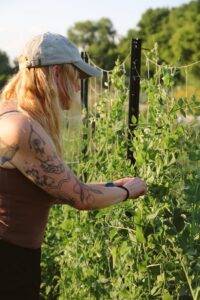
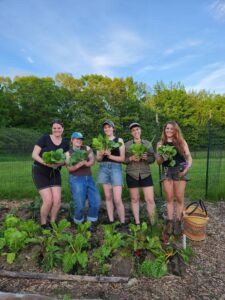
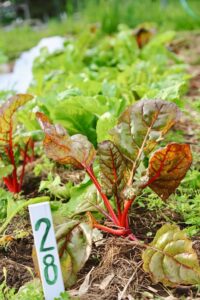
Seedsong Collective Garden and Starr Collective Garden are two member-run collective gardens managed in partnership with Vermont Garden Network (VGN). We are inspired by organic farming, agroecology, permaculture, and market gardening movements and apply these practices at both sites.
Over the years, VGN has become acquainted with challenges at each site – notably, devastating floods at Seedsong and deer pressure at Starr. Our shift towards a hub and spoke model, whereby both gardens will be working in tandem, is our approach to address these challenges and share abundance.
VGN will coordinate crop plans, purchase bulk materials, distribute surplus harvest when available or necessary, and partner with a team of garden mentors at each site. Mentors work closely together to coordinate weekly work shifts in the gardens so that members know what tasks to focus on. Each collective garden will have its own crew responsible for all garden management at that site; however in the case of major flooding or pest damage, your garden may become everyone’s garden. As Robin Wall Kimmerer reminds us, “All flourishing is mutual.”
________________________________________________________________________
Step 1: Choose Your Garden Site
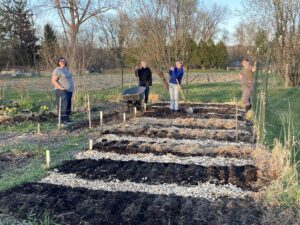
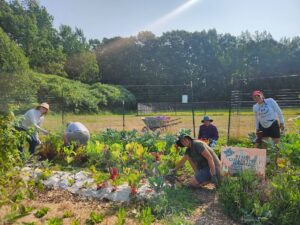
We encourage you to choose a garden site that is most accessible to you on a regular basis or a location that you have a personal connection to. For example, if you live in the New North End or have a dog who you frequently take to the Starr Farm dog park, then joining Starr might make the most sense for you. Alternatively, if you live closer to downtown Burlington/Winooski or enjoy walking paths through the Intervale, then Seedsong might make the most sense for you.
Both garden sites have a similar square footage (~4,000sqft) and perennials including asparagus, berries, medicinal and culinary herbs. Both sites have ample free parking, picnic tables, and a dog-on-leash policy. Both sites require gardeners to walk on a grassy lawn to access the garden. See below for specific locations and accessibility considerations at each site. You will be asked to select your garden site in the Collective Garden Registration Form. VGN can welcome a minimum of 15 and a maximum of 20 gardeners at each site.
- Seedsong is located at the Intervale within the Tommy Thompson Community Garden, at the Intervale, in Burlington. Accessible via bike, walking from the Old North End, or car. If biking or walking, please note that there is a steep hill to navigate to/from the garden.
- Starr is located within the Starr Farm Community Garden, in the New North End, in Burlington. Accessible via bike (located right off the bike path), car, walking distance from New North End neighborhoods and a 12 minute walk from bus stop on North Ave, corner of Starr Farm Rd.
Having access to these lands is a gift. We honor and express gratitude toward the indigenous peoples and seed stewards who came before us. We tend to this land by cultivating soil fertility and saving seeds with future generations in mind. We are also grateful for Burlington Area Community Gardens (BACG) and shared infrastructure that facilitates our access to water, picnic shelters, community fruit orchards and pollinator habitat.
________________________________________________________________________
Step 2: Review Member Expectations
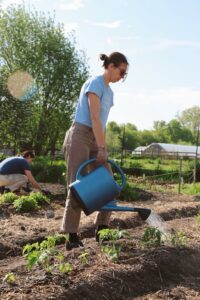
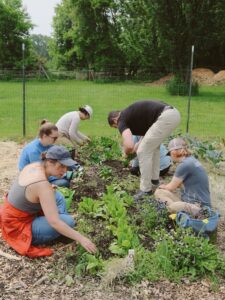
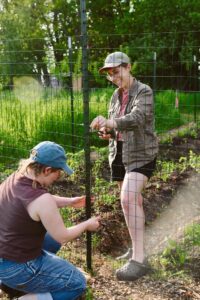
Sign up for a 2hr weekly garden shift
This is where the real work begins! Show up ready to dig your hands in the soil. We provide all the necessary tools and materials, you arrive with a collective spirit to jump in where you are most needed. All members must be able to consistently join at least one of these weekly shifts, Mondays 5:30-7:30pm, Wednesdays 5:30-7:30pm or Fridays 7-9am. Occasional weekend watering may be asked of members on an as needed basis, particularly during peak summer heat or when there are newly transplanted seedlings or freshly planted seeds.
Once a month, participate in a weekend work day ending with a potluck!
These work days are for each individual garden and gives time for garden members (who are spread out throughout the week) to come together and tackle bigger projects like prepping beds, installing fencing, planting the herb garden, etc. The work day will end with a potluck, a much anticipated gathering intended to savor seasonal harvest and connect over garden fresh recipes after a solid morning’s work. Please make sure your schedule allows you to join as many work days as possible. Work days are one Saturday or one Sunday a month from 9:30 am-12:30pm.
- Seedsong Collective work days are scheduled on the following Saturdays: April 11 (Opening Day), May 16, June 13, July 11, August 8, September 12, and October 17 (Closing day)
- Starr Collective work days are scheduled on a mix of Saturdays and Sundays: Sunday April 12 (Opening Day), Saturday May 2, Saturday June 6, Sunday July 12, Saturday August 1, Saturday September 5, and Sunday October 18 (Closing Day)
Hands-On Workshops
There will be two hands-on workshops throughout the season, the first on Thursday, July 16 from 5:30-7pm and the second on Thursday, September 17 from 5:30-7pm. Workshops are taught by VGN and will be made available for both collectives, providing a chance for the two collectives to come together and connect. The workshops are a hands-on opportunity to learn more about how to use the plants growing in the garden. Members have learned about plant based dyes and taken home an indigo dyed silk scarf or learned about lacto-fermentation and taken home a jar of kimchi. This year’s collective will decide on the workshops based on the harvest and what members want to learn more about.
Keep up with garden member communication
The collective uses group emails, a Shared Google Drive folder, and a Signal text message group to communicate. You should expect weekly communication from the garden mentor team to confirm upcoming dates, share friendly reminders on systems we have in place, and many other timely announcements that help keep collective gardens running smoothly. The Signal group chat is also a place to share photos, triumphs and hardships.
Take home harvest
As harvest comes into abundance, you are encouraged to take home harvest for your individual consumption on a weekly basis. When there is extra harvest (as the season progresses, there often is!), we encourage you to take more harvest to share with your home and broader community.
Sign agreements
All garden members are asked to sign a garden agreement, liability waiver and media release form.
Contribute a garden membership fee
See below for more details.
________________________________________________________________________
Step 3: Contribute a Membership Fee
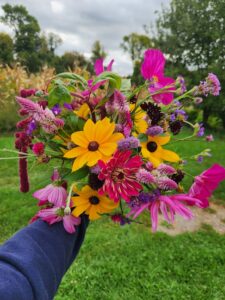
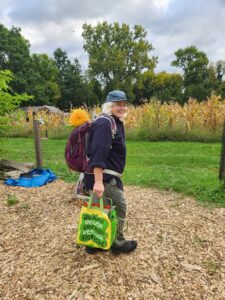
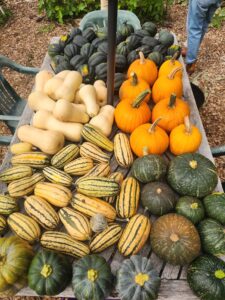
To put it into perspective…
Renting a full garden plot in Burlington’s community gardens costs $110. That fee simply gives you access to land. Add the cost of compost, amendments, straw, seeds, starts, flower bulbs, trellises, gloves, pruners… and you are getting close to investing $300-$500. Now plan on watering daily during summer heat, keeping up with aggressive weeds, and knowing what to do when Colorado potato beetles devour your plants. All that time and energy has a cost too.
A small CSA share at local farms ranges between $400-650. Although you won’t get quite as much consistent harvest at Seedsong or Starr (we are small-scale gardeners, not market-focused farmers!), you will still take home a considerable amount of seasonal harvest, including flowers, culinary and medicinal herbs.
—
Becoming a member of one of VGN’s collectives gives you access to everything a collective garden offers including access to growing space, weekly harvest of veggies, flowers & herbs for seven months; all the tools & materials required to manage a garden for a full season; weekly mentorship and educational opportunities to support aspiring expert gardeners; a shared workload that fosters a deep sense of camaraderie; and direct climate action through land stewardship.
Full membership fee: $600 – This fee covers the full cost of participating in a 7-month long collective gardening season.
Reduced fee: $450 – We have reserved a limited number of reduced fee memberships. The reduced fee is open to people who identify as part of a marginalized population, including, but not limited, groups excluded due to race, gender identity, sexual orientation, age, physical ability, language, and/or immigration status. If you identify as such and would appreciate the financial support, please select this membership fee.
Payment plan: Available for both fee options. Members are required to make a $150 deposit upon registration. Once you have registered, we will be in touch to set up monthly payments of $150. The membership fee of $450-600 must be fully paid by July 1, 2026.
If the reduced fee and payment plan options are still a barrier for you to participate in VGN’s collective garden program, please email angela@vtgardens.org to explore other options.
Here is the quick link to REGISTER when you are ready!
—
By becoming a collective garden member you will have access to:
Harvest
“ I was trying to keep track of the harvests clearly at first to see if I felt that the total fee was worth it for me, and I quickly gave up and decided it was for sure worth it (not only for the amount of produce, but also the community aspect!). I felt like I had a very good amount of produce throughout the season, and was sometimes just trying to keep up with my weekly harvest.” – Collective Garden Member
- Weekly: Most seasonal produce is harvested and distributed during weekly garden work shifts. Members dedicate 2hrs of physical work in the garden in exchange for taking home harvest. Harvests begin as early as the first week of May and with lingering harvests as late as Thanksgiving! Weekly harvests increase in abundance as the season progresses.
- PYO: Some crops are available for pick-your-own on a flexible schedule. Members can visit the garden anytime to harvest crops such as lettuce, kale, spinach, chard, culinary & medicinal herbs, and flowers.
- Bulk: A handful of crops are harvested all at once and then equitably distributed among members during community work days or on a pick-up basis. Storage crops that we commonly bulk harvest include: garlic, potatoes, fall root vegetables, and winter squash.
- Cross sharing abundance: Sharing crops that are in over abundance between Seedsong and Starr is possible. For example, if it’s a bumper tomato year and there are too many cherry tomatoes for one collective to consume, the other will be invited to harvest.
- Crop loss assurance: In the case of crop loss in one garden, the other garden will supply harvest to the affected garden to the extent possible. In most cases of crop loss, VGN will coordinate replanting and shared harvest to support the affected garden.
Food as medicine
- Take home regular supplies of medicinal herbs from both perennial and annual plants in the garden and surrounding plantings.
- Access to perennial fruits (like apples & pears) and berries (like elderberries & blueberries) from neighboring perennial plantings.
Mentorship
“All of the mentors were so knowledgeable and supportive. As a new gardener, I found it very helpful to have someone to “guide” the work each shift and give tips for how to grow certain things more effectively. I feel like the built-in support within the collective from all the mentors, especially Angela, was one of the main reasons our garden was so successful!” – Collective Garden Member
- Members are supported by experienced mentors who provide guidance in following the task list, answers to garden related questions that may come up, and maintain continuity between each shift.
- Take the pressure off and learn by doing. No matter the level of gardening experience you have, you are guaranteed to learn something new about gardening without the pressure of having to learn it all on your own. Members acquire gardening skills by working alongside each other, with hands in the soil and by gaining access to video tutorials that demonstrate how to secure row cover, harvest certain crops, and more.
Community
“I think the collective gardening model is extremely special and something that everyone would have a chance to try in an ideal world. Growing food together is so joyful and meaningful and I feel like we really built community and camaraderie among the gardening cohort this season. People made bonds that will last beyond the garden.” – Collective Garden Member
- Monthly group work days and potlucks are much-loved gatherings to get larger projects done, celebrate the harvest season, share recipes, and enjoy each other’s company.
- Group text messaging via Signal keeps garden members connected and serves as timely communication for garden-related announcements.
- Enjoy the benefits of collective gardening: flexibility, mutual support, friendships. When many people share a garden space, we are each able to take time off and trust that someone else is taking care of the garden, we meet new people and form meaningful relationships while weeding, and we go home with nourishing food!
Materials
- All gardening inputs, including: compost, soil amendments, organic seeds, a variety of plant starts grown in the Greenhouse at Landry Park, organic fertilizers and pest management supplies
- An assortment of essential gardening tools, including: long-handled tools, hand tools, pruners, scissors, broadfork, watering cans, collapsible hose, quality watering wand
- Helpful gardening supplies, including: trellises, twine, row cover, weed mat, low tunnel for season extension, harvest baskets and strainers
________________________________________________________________________
Step 4: Register!
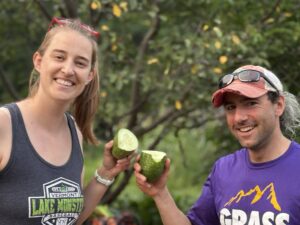
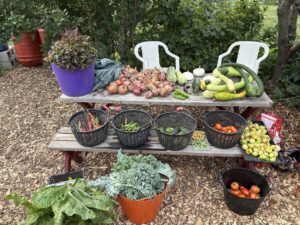
Please fill out the Collective Garden Registration Form to save your spot and contribute your membership fee. Registration is first come, first served.
Registration deadline: March 27, 2026

 Follow us on Instagram
Follow us on Instagram